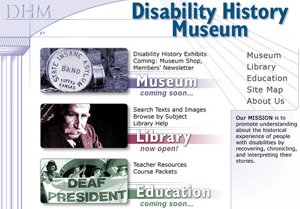talking history | syllabi | students | teachers | puzzle | about us
Disability History Museum
http://www.disabilitymuseum.org
Sponsored by Straight Ahead Pictures, Inc. Laurie Block, executive director.
Reviewed Oct. 8, 2004.
The Disability History Museum Web site exists principally as an online library, and as such, it offers students, scholars, and teachers of disability history an important resource. When the site reaches full maturity as a library, museum, and teacher resource center, it will be invaluable to anyone who wishes to view the historical meanings of disability through a social, rather than a medical, lens.

A deep understanding of the field pervades the site. A project of the prodigious researcher and filmmaker Laurie Block, the Disability History Museum boasts a stellar board of directors, all leading scholars of disability. The library approaches disability from the vantage points of political, social, cultural, educational, institutional, military, labor, intellectual, and—to some extent—medical history. Cognitive, physical, psychiatric, and sensory disabilities all receive attention. By scouring archives, publications, and personal collections from around the country, Block and her associates have amassed an impressive digital collection of documents and visual stills. The site, moreover, provides an extensive glossary of disability-related terms, multiple search functions (by any of 302 keywords), and clear citation instructions.
This site proves the feasibility of disability history research by redefining the scope of viable sources. Focusing little on the medical, the library instead looks to the social, the familial, the political. The site’s 1,654 articles, letters, pamphlets, book excerpts, photographs, paintings, postcards, and lithographs form a robust collection. Consider, for example, a 1932 Polio Chronicle photograph of Franklin D. Roosevelt at his Warm Springs, Georgia, rehabilitation center, captioned “They Pause On the Porch of the ‘Little White House.’” Standing with Eleanor, his daughter Anna Roosevelt Dall, and his personal bodyguard, Gus Gen-nerich, FDR holds a cane in one hand and tucks his other hand into the crook of Gennerich’s elbow. The keywords listed for this still invite a complex analysis of the image: “Assistive Technology, Cane, Disease, Eleanor Roosevelt, Family, Franklin D. Roosevelt, Georgia, Government, Institutions, Physical Disability, Polio, Politics, Rehabilitation, Warm Springs Foundation.” Or take the 1914 New York World article, “Zip, the ‘What Is It?’ Plays Host to All Other Circus Freaks.” Here, the reporter describes a birthday party for William Henry Johnson, a black man with microcephaly, whom P. T. Barnum began “exhibiting” in 1860. One could not find a clearer—or more offensive—exegesis of early twentieth-century American attitudes toward people with a range of physical disabilities than this brief piece provides in the guise of humor. Here, the site lists eighteen keywords: “African-American, Alcohol, Amputees, Ceremonies, Circus, Cognitive Disability, Employment, Entertainment, Freak Show, Giants, Native American, New York, New York City, Phineas T. Barnum, Popular Culture, Public Relations, Short Stature, William Henry Johnson.”
Adding approximately one hundred artifacts to the site monthly, Block and her colleagues hope to launch the museum and the teacher resource center components in the near future. These will include interpretive exhibits, background essays on a wide range of general historical and disability-specific topics, and a slew of curriculum materials.
The Disability History Museum adds a new dimension to the disability-related sites, exhibits, and collections currently on the World Wide Web. In its comprehensiveness, its intelligent design, and its underlying understanding of disability as a social, rather than medical, category, the site is unique among online resources on the history of disability.
Lauri Umansky
Suffolk University
Boston, Massachusetts
